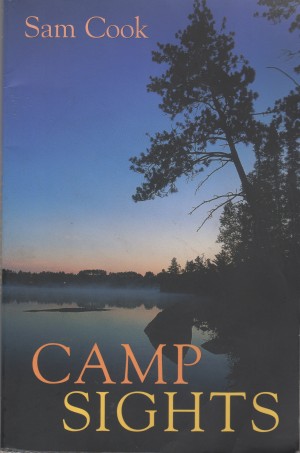Camp Sights by Sam Cook (1992. University of Minnesota Press. ISBN 0-8166-4184-6)
While on my recent sojourn to Woodland Caribou Provincial Park in Ontario (see “Caribou” below for a full report on the trip), I cracked open Camp Sights by Duluth author and newspaper man, Sam Cook while sitting on granite staring at Secret Lake in midday, around the campfire at night, or in my tent as I shook off aches and pains and headed towards sleep. What I discovered in re-reading this old collection of Cook’s work culled from the pages of the Duluth News Tribune, where Cook has been the outdoor writer since 1976 (I was still in college so Sam’s got a few years on me!) is that Cook’s earlier writing emulates, to an extent, the essays of Sig Olson, one of America’s foremost outdoor writers. Not every story in this offering from the University of Minnesota Press attempts to be Olsonesque. But there are certainly echoes of the old conservationist in many of the stories, including “Well Worth It” (about not catching lake trout), “Thunderbolts” (replicating what it’s like to anticipate a storm while tenting in the wilderness) and “Whiteout” (a tale about being snowed in with dogs on a dog sledding expedition out of Great Slave Lake). Those are the stories, in my humble opinion, more so than the pure reportage Cook has leaned to in the later stages of his time at the DNT, that make a reader pick up a Duluth Pack, hoist a canoe onto his or her shoulders, and head north. Which, if you’ve ever read Sig Olson’s Listening Point or his other classics, is exactly the sensation you’re left with after reading Olson’s masterpieces. I miss the sense of wilderness magic Sam’s earlier pieces seemed to gravitate towards. I understand that, in this day of diminished resources at newspapers, outdoor reporters are being called upon to put aside their literary flourishes and simply tell us how to catch fish, where to hunt deer, and whether prairie potholes will produce ducks. I get the need for the newspaper to supply outdoor information as a viable means of selling its product to men. After all, most men read sparingly and, when they do read, they read for information not entertainment. So I get that, to sell papers, Sam needs to tone down the wistfulness of his pieces and hone in on data. And I need to be honest here: this change in tone within Cook’s writing is not universal. Sam still comes through with some dandy pieces of contemporary essay-style writing now and again. But if you want to read the best Cook, read his books where you’ll find passages like this, Cook’s description of a dream paddle in the Canadian wilderness:
No portage would be too tough, for there would be time, plenty of time. No perfect island campsite would have to be paddled by, for there would always be another night and another camp. No Indian rock paintings would be too far off the beaten path to inspect.
Ah, but in reality there were spouses and little people and jobs waiting, and there we were, paddling across Batchewaung toward the end of our trip.
The rain came down harder. Everything was wet. Warm rain poured down the backs of our necks and trickled down the valleys of our backbones.
(From “Batchewaung”)
Hopefully we’ll be treated to a few more gems like this one before Cook joins his contemporaries Pates and Stodghill in retirement from the newspaper game. And while we wait for the eventuality of there being no more Sam Cook in the DNT, there is a plethora of older Sam Cook essays waiting to be re-read in the form of his books. If I were you, I’d pick up Camp Sights, or any of Sam’s other collections to take along on your next outing.
4 1/2 stars out of 5.



